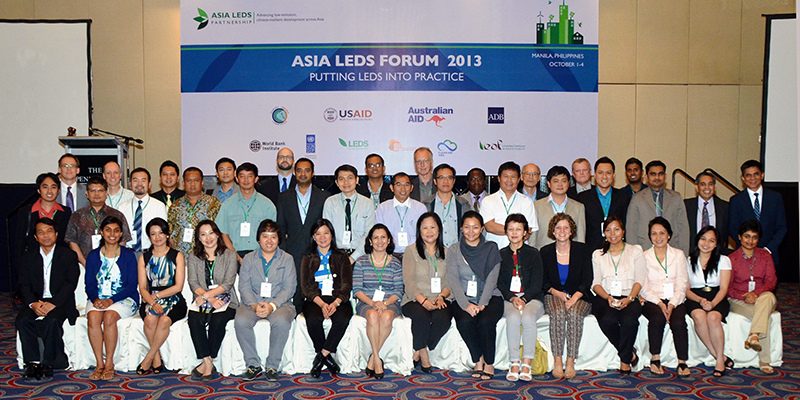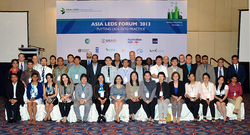Shaping up LEDS at Asia LEDS Forum 2013

Held in Manila, Philippines from 1-4 October 2013, the second annual gathering of the Asia LEDS (Low-emission Development Strategies) partnership, Asia LEDS Forum 2013: Putting LEDS into Practice, brought together 250 representatives from 22 Asian and Pacific countries and peers from Africa, South America, North America and Europe – national and subnational governments, international organizations, civil society groups, academic institutions and businesses.
The Asia LEDS Forum worked towards three main objectives: to support peer learning and sharing, build communities of practice and acquire skills to support LEDS implementation. Hosted by the Philippines Climate Change Commission, with support from Asia LEDS Partnership members including United States Agency for International Development (USAID), Australian Agency for International Development (AusAID) and Asian Development Bank (ADB) in partnership with various collaborators like the World Bank Institute, United Nations Development Programme (UNDP) etc, the Forum consisted of various workshops, side meetings, learning and sharing of best practices, strengthening peer networks and addressing challenges and skills training for LEDS Practitioners.
ICLEI South Asia took the opportunity of presenting during the “Open Space Session: Tools and Good Practices for Implementing LEDS and Green Growth”, a presentation on “Transitioning to Low Carbon Urban Development through Enhanced Local-National Dialogue” emphasizing the role Urban LEDS play in the transition of a city to a low-emission, green and inclusive urban economy, through its integration into city development plans and processes.
Some salient observations of the Asia LEDS Forum have been listed below:
– LEDS should be articulated in a way that relates and gives weight to not just reducing Greenhouse Gas (GHG) emissions but also development, adaptation and mitigation.
– Policy-makers and practitioners need tools to help message LEDS in order to get buy-in from national and local stakeholders to drive the process forward.
– Due to the over abundance of information regarding LEDS and the “data blizzard” and user confusion it creates, it is very important to have the ability to filter information to identify the most targeted resources.
– Capacity building in sectors like tools training, promoting innovations and gaining non-technical information on how to create conditions that enable wide-scale change needs to be stressed upon.
– More guidance is needed on how to put LEDS into practice. Detailed case studies showing how LEDS have been implemented and potential application in other contexts can be effective.
More information on the Asia LEDS Forum can be found here.
